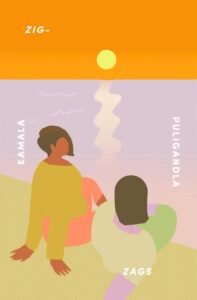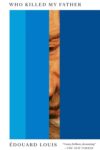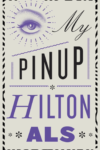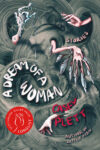
[Not a Cult; 2020]
If one insisted on putting Zigzags in a category, it might be fitting to describe it as a “summer novel.” Like many great books and films of the season, Zigzags captures the buzz of summer in all its glory — the three-month capsule of possibility when one is ripe for the sort of love and mishaps which are slightly more permissible in those hot, sticky months. Divided into three parts, the book immediately drops the reader at summer’s commencement, a time which feels both like a pause and a beginning, with “no place to return to, no place to move towards.” Protagonist and narrator Aneesha has just finished the first year of her MFA at UC Riverside and returns to Chicago for the summer, staying with her ex-flame, Whitney, who eternally varies between crush and friend and lives with her semi-new trans boyfriend, Logan. Aneesha is joined by a cast of loyal friends, who take the classic traits of a misfit crew and are elevated to new heights, each with a rich backstory of their own, decorated with specifics that speak to Kamala Puligandla’s intentional crafting of character.
This is Puligandla’s first novel, released earlier this month by Not a Cult Media. She emerged with this book after years of writing and editing in other capacities, most notably as the current Editor-in-Chief of Autostraddle.com. Puligandla describes her writing as “for and about the radical, queer, mixed, black/brown, folks who continue to show me the great pleasure my life can be, and who inspire my visions of our future.” This foundation is apparent in Zigzags, and in the crafting of Aneesha, whom Puligandla has described as her doppelganger.
Largely queer and arts-inclined, Aneesha and her friends fill the hours together, drinking at the Heartland Cafe, taking day trips to farms and lakehouses, and dancing into the night. However, Zigzags goes beyond being merely a “summer novel” and becomes, in essence, a novel about grappling with what it means to be an adult — negotiating time, aging, self-destructive habits, the impending strangeness of “settling down,” and wrestling with a deep desire for things to always be the same, but also, the desperate need for them to feel new.
The Heartland Cafe feels like a natural part of the late-20s milieu, serving as a common backdrop for the evolution and regrouping of friendships, and also as an ample stand-in for the characters’ disillusionment. Early on, Aneesha recalls, “According to legend, the Heartland Cafe in its full glory was a hub for artists and queers, vegans and radicals — it was a cornerstone of Rogers Park. By the time I got around to it, however, it struck me as a dysfunctional co-op.” Asides about the cafe’s uncleanliness and lack of funding pepper the characters’ conversations, even as it serves as a recurring landing place and source of grounding. Both the friend group and the cafe are hit head-on by the blunt reality of time capitalism, a version of living that is less about leisure and more about making serious decisions about serious things. Both are victims to the symbolic nudge of a grown-up, telling them that being “quirky” is no longer enough to qualify as a raison d’etre.
Puligandla’s prose shines in its descriptions, the language making each setting visceral and easy to imagine. But the dialogue is perhaps her strongest vehicle, capturing a mid-to-late-20s sardonic earnestness that can only be conjured from personal experience. All characters contribute their fair share of remarks in voices that are unarguably millennial but self-aware enough to empathize with. They tackle topics from parenthood to travel, queerness, and neoliberalism. Inside all of them festers a desire to be a person who thinks about ideas, embodying some version of being adjacent to academia, stemming perhaps from a desire to feel cultured, or even just connected — purposeful— in a way that never fully divorces itself from the concepts being butted up against. When Aneesha visits her friend Jesse’s farm, he tells her: “Been reading n+1, good stuff, love literary criticism, totally agree it’s been underrepresented in the plethora of shit being published on the Internet . . . God, I can’t fucking tell you how long I’ve been waiting to have a conversation about literature . . . this is gold, it’s pure gold.” Puligandla brilliantly captures this sort of intellectual anxiety, placing the reader on both sides of the glass. Jesse’s dialogue is gratuitous, almost cringe-worthy in how much it might remind readers of a desperate, pseudo-philosophical male they once knew. But the desire is also relatable, as it reflects the fleeting impulse to feel stimulated as we trudge forward with whatever version of “work-life balance” we insist we have.
And of course, Aneesha isn’t adjacent to it; she’s in the throes of graduate school by the time we meet her. Like summer, the MFA program is both a pause and a beginning, full of unknowns but also a marked step backwards out of the stream of previous duties. It’s a strange in-between of a life phase, as Aneesha describes when asked how it’s going: “Well, school is fine,” she says, “I live in a house.” Which is really, at its core, the answer.
Puligandla chooses to portray a view of adulthood that is firmly rooted in realism, but insists, still, on validating nostalgia. The arc is less about accretion or gain, failing to lead the characters towards some new wondrous career opportunity, or toward the prospect of finally falling in love with the object of affection. Rather, Puligandla’s story sits, continuously, with loss, but loss as an active thing — as a crucial part of growth. “You will lose me, even if just a little,” Aneesha tells her best friend. “I hope you do, anyway, for my sake.” The rift accompanies progress; it is all at once a fact, a thing to lament, and a speckle of hope. It is part of friendship, “the grandest promise I know how to make.”
As Aneesha navigates her way through that Chicago summer, she understands that she is no longer part of those youthful spaces, at least not in the way she was before: “We didn’t need the Heartland anymore. We didn’t need Chicago — they weren’t the reason we were here together.” Zigzags is a tender ode to friendship that stays firmly planted in a modern, queer temporality. The precision of voice and the breadth of detail given to each character keep the novel from tipping towards cliche. Instead of grieving the once-rambunctious rapport of an early 20s friend group, it revels in the change and the way that things slow down and eventually dissipate. “The draw of friendship, I thought, was that you already knew exactly what to look forward to,” concludes Aneesha, knowing that the lack of newness signifies a certain stability that in itself provides a necessary warmth.
Beyond that, veiled beneath the novel’s feel-good friendships is a poignant reflection on alienation in adulthood and the continuous evolution of the brown, queer body. It takes little critical thought to conclude that life is increasingly filled with distance, whether geographic or emotional. The rupture of coziness that most often punctuates the high school-college transition continues to replicate itself in various ways. “Creatives” and “academics” know this shuffle well, their lives at the whim of whichever university, residency, department, or institution chooses to give them space, even if temporarily. No doubt this experience carries a multitude of consequences — the external one most often is that the individual becomes adrift, counterbalanced perhaps by trying to stay plugged in, attempting to feel relevant in the lives of friends and family through digital community or occasional collaboration. And then, of course, there is money, or lack of it, and the onslaught of systemic fuckery this inherently brings. Internally, then, the consequence is less a single thing and more an ongoing process of being forced into mental somersaults of understanding, of bridging the gap between what one knows is happening (and has been happening, and will continue to happen) and what one hopes is true kinship and safety and permanence, unable to be destroyed. And somewhere in there lies acceptance. A sort of “coming to terms with aging,” except the aging is from age 25 to 30 or maybe 35, which is really not so much aging, but it still feels quite heavy and slow, representing a marked time of reckoning and reflection. Thus the phrase: quarter-life crisis. The quarter-life crises of Puligandla’s characters come after years of embodied struggles.
Slipped beneath the witty banter lies the truth of the matter: Aneesha is a brown, queer body, a self-described dyke, who has insisted for years on becoming a version of herself not dictated by society’s hegemonies. In crafting a narrative, striking this balance can be difficult. Speaking firsthand as a writer of color, it feels impossible not to engage with identity. Like somehow, if all my stories or poems don’t center on oppression, then I’m not doing justice to the socio-historic narratives that precede me. Tacked onto that fact is, for better or worse, publishing knows that to stay relevant, they have to be amplifying such narratives. And of course, this writing is crucial; it is a non-option. And there’s so much vital work that confronts this violence head-on. But I’ve found myself asking, both as a reader and a writer, what if I tried writing beyond that violence? Beyond simply saying “I am this body, and I am in this room” and instead considering “What will I do in this room? Who will be in it with me? What will we make? What will we feel?” The plot of Zigzags doesn’t dwell so much on instances of racial oppression, but Aneesha is still written as an individual aware of her otherness. Among the LGBTQ community, so much of Aneesha’s “time in queer circles had felt like a charade.” Puligandla’s character is self-referential in her queerness, nodding to her participation in what feel like tropes — camping lesbians, flannels, karaoke, and (un)accidentally falling, again and again, for girls who identify as straight. Even among the support of her leftist friends, it is never erased that they, on some level, walk through the world differently than she does, whether due to being white, straight, or straight-passing. And in spite of this — her gayness, the turbulence of friendships, her ever-changing life — Aneesha insists on dancing and laughter. Zigzags is a nod to the persistence of queer joy, a radical thing in and of itself.
“I think it’s going to be okay,” says Aneesha in the book’s third part. “I mean, yes, it was always going to be okay, but I think it might actually feel that way.” Trudging ahead, despite it all, is victory. And knowing that things end, and letting them end with grace and ease, is perhaps this story’s greatest takeaway.
Sarah Sophia Yanni is a poet and educator in Los Angeles. Her writing has appeared in feelings, DREGINALD, Rivulet, and others, and she was a finalist for BOMB Magazine’s 2020 Poetry Contest. She holds an MFA from CalArts, where she currently works as a Graduate Faculty Fellow. Find her occasionally tweeting @saritahyanni.
This post may contain affiliate links.







